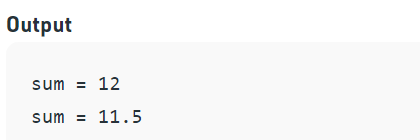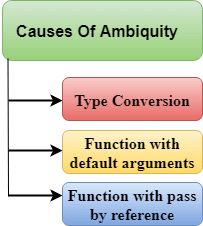C++ Function OverloadingIn brief Object-oriented programming is a notion found in C++ (also known as OOPS). We will talk about function overloading among the various attributes found in OOPS. Every programming language offers the ability to reuse previously written code by using functions. The number and type of parameters provided to a function are typically decided by the programmer based on the definition of the function. Function overloading is a further characteristic of programming languages that enable OOPS ideas in relation to functions. It makes reference to the possibility of having many functions with the same name but distinct parameters. Two or more functions may share the same name but not the same list of arguments when functional overloading occurs. It is a key characteristic of C++. Compile-time polymorphism and function overloading are similar concepts. A close examination reveals that the name stays the same, although the list of arguments, data type, and order all change. Take a look at a C++ function overloading example. The advantage of Function overloading is that it increases the readability of the program because you don't need to use different names for the same action. C++ Function Overloading ExampleLet's see the simple example of function overloading where we are changing number of arguments of add() method. // program of function overloading when number of arguments vary. Output: 30 55 ExampleOutput: 
In the aforementioned example, we can see that two functions are defined as a piece of code. The names of the functions are the same-"addPodium"-but the return type, the list of input arguments, and the data types for those arguments have been altered. Let's see the simple example when the type of the arguments vary. // Program of function overloading with different types of arguments. Output: r1 is : 42 r2 is : 0.6 Function Overloading and AmbiguityWhen the compiler is unable to decide which function is to be invoked among the overloaded function, this situation is known as function overloading. When the compiler shows the ambiguity error, the compiler does not run the program. Causes of Function Overloading:
Type Conversion: 
Let's see a simple example. The above example shows an error "call of overloaded 'fun(double)' is ambiguous". The fun(10) will call the first function. The fun(1.2) calls the second function according to our prediction. But, this does not refer to any function as in C++, all the floating point constants are treated as double not as a float. If we replace float to double, the program works. Therefore, this is a type conversion from float to double. Function with Default Arguments Let's see a simple example. The above example shows an error "call of overloaded 'fun(int)' is ambiguous". The fun(int a, int b=9) can be called in two ways: first is by calling the function with one argument, i.e., fun(12) and another way is calling the function with two arguments, i.e., fun(4,5). The fun(int i) function is invoked with one argument. Therefore, the compiler could not be able to select among fun(int i) and fun(int a,int b=9). Function with pass by reference Let's see a simple example. The above example shows an error "call of overloaded 'fun(int&)' is ambiguous". The first function takes one integer argument and the second function takes a reference parameter as an argument. In this case, the compiler does not know which function is needed by the us Why is C++ Using Function Overloading?Over traditional structured programming languages, the OOPS ideas offer a number of benefits. Overloading functions is regarded as compile-time polymorphism. With the help of this OOPS idea, a programmer can create a function with the same name but a distinct execution pattern, enabling the code to be more understandable and reusable. What are the rules of function overloading in C++?When overloading a function in C++, there are some guidelines that must be observed. Let's take a closer look at a few of them: 1) The parameters for each function must be in a distinct order. 2) The functions have to be named the same. 3) The parameters for the functions must be distinct. 4) The parameters for the functions must be of various sorts. What are the types of function overloading in C++?In C++, there are two types of function overloading. Those are 1) Overloading at compile time occurs when alternative signatures are used to overload the functions. The function's return type, number, and type of parameters are all regarded as the function's signature. 2) Overloading that occurs during runtime refers to the overloading of the functions. Time overloading occurs when a different number of parameters are added to the function during execution. What are the advantages of function overloading in C++?Here are a few benefits of function overloading in C++. 1) The programmer can create functions with distinct purposes but the same name by using function overloading. 2) It speeds up the program's execution. 3) The code is clearer and simpler to comprehend. 4) It reduces memory utilization and makes programs reusable. What are the disadvantages of function overloading in C++?The following are some drawbacks of C++ function overloading. 1) The primary drawback of function overloading is that it prevents the overloading of functions with various return types. 2) The identical parameters cannot be overloaded in the case of a static function. What are the differences between function overloading and operator overloading?
What are the differences between function overloading and function overriding?
|
 For Videos Join Our Youtube Channel: Join Now
For Videos Join Our Youtube Channel: Join Now
Feedback
- Send your Feedback to [email protected]
Help Others, Please Share









